Tuesday, March 4, 2025. Annette’s Roundup for Democracy.
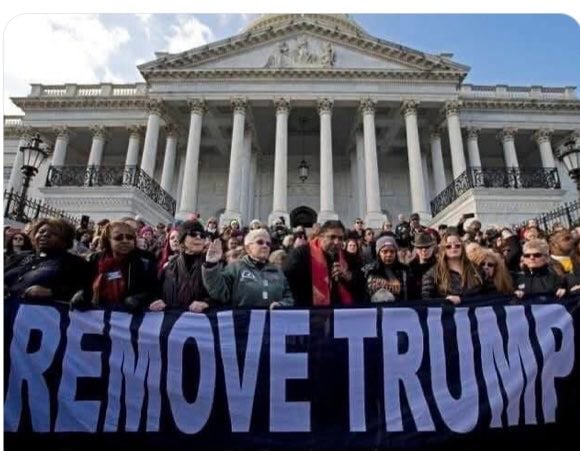
Will Europe save Ukraine?
Nobel prize winning economist Paul Krugman says they have the money. Do they have the will?
It’s Up to Europe Now.
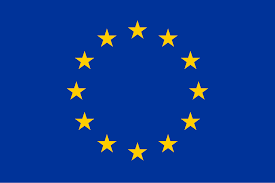
Does Europe have the resources to save Ukraine? Of course it does. The European Union and the UK combined have ten times Russia’s GDP. European aid to Ukraine has long exceeded US aid, and Europe could easily replace America’s share. In the early stages of the war, the US provided the bulk of the military aid, but even that gap has greatly narrowed:
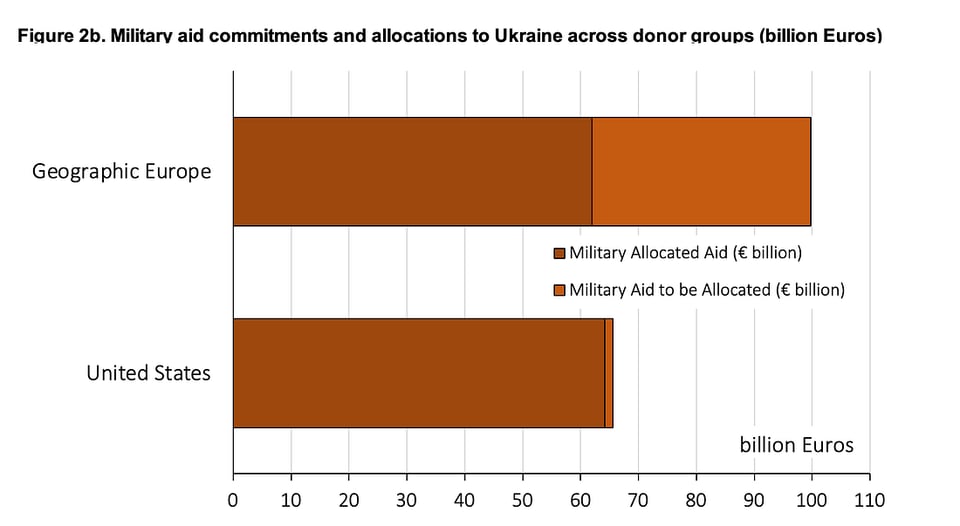
Source: Kiel Institute
Can Europe step up fast enough? There are, as I understand it, some important weapons systems America may stop supplying that Europe can’t quickly replace. But as Phillips O’Brien has pointed out, we’ve been hearing predictions of Ukraine’s imminent collapse for at least a year, when the reality is that Russia has achieved only minor and meaningless territorial gains at immense cost in men and materiel. When Trump told Zelensky
You don't have the cards. You're buried there, people are dying, you're running low on soldiers.
he was almost surely wrong. Ukraine can probably hang on long enough, even with a total cutoff of US aid, for Europe to come to its rescue.
So it really comes down to political will.
Trump probably imagines that he can bully European leaders into standing aside and letting his friend (or boss?) Vladimir win. And given Europe’s history of timidity, you can understand why he might think that. But European leaders are certainly saying the right things now and also talking, in a way I’ve never seen before, about in effect declaring independence from the United States.
If Trump nonetheless tries to pressure Europe into abandoning Ukraine, say by imposing tariffs on European goods (which seems to be his only tactic), someone will have to tell him, “Sir, you don’t have the cards.” The EU exports less than 3 percent of its GDP to the United States. And there’s already a public backlash against even the threat of tariffs, as well as the absence of any visible effort on Trump’s part to make good on his campaign promises to bring down grocery prices.
In short, Europe shouldn’t be afraid of Donald Trump. If it wants to save democracy in Ukraine, it can.
And it should. If Ukraine falls, it won’t be the last target. And the rise of right-wing extremist parties in some European nations should make supporters of democracy even more determined to counter anything that might make people believe that these parties represent the future, which means among other things denying Putin anything that can be spun as a victory.
Like tens of millions of Americans, I hate the fact that we need to appeal to foreign leaders to do the right thing, because we know that our own president won’t. But this is Europe’s moment, and we can only hope that the continent’s leaders seize it. (Read Krugman’s full essay at the link above 👆).
One more thing.
A promising thing.
BREAKING: UK Prime Minister Keir Starmer: “The UK is prepared to back this with BOOTS on the ground and planes in the air.”
— Brian Krassenstein (@krassenstein) March 2, 2025
Europe will save Ukraine and the West. pic.twitter.com/YkSUWxsDEL
I don’t want to carry on about what Trump did in the Oval Office but we won’t forget either.
First, a remarkable picture.
Touch to watch. 👇
Meanwhile in #New_York
— Anonymous Germany (@Anonymous00708) March 3, 2025
🇺🇦🇺🇦🇺🇦 pic.twitter.com/k3PjSUuhp6
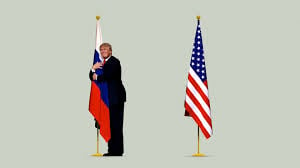
illustration: Lazaro Gamio/ On the occasion of Trump’s groveling to Putin in Finland, July 2018. Axios.
From the Bulwark.
What a Weekend for Putin!
WILLIAM KRISTOL, ANDREW EGGER, AND SAM STEIN.
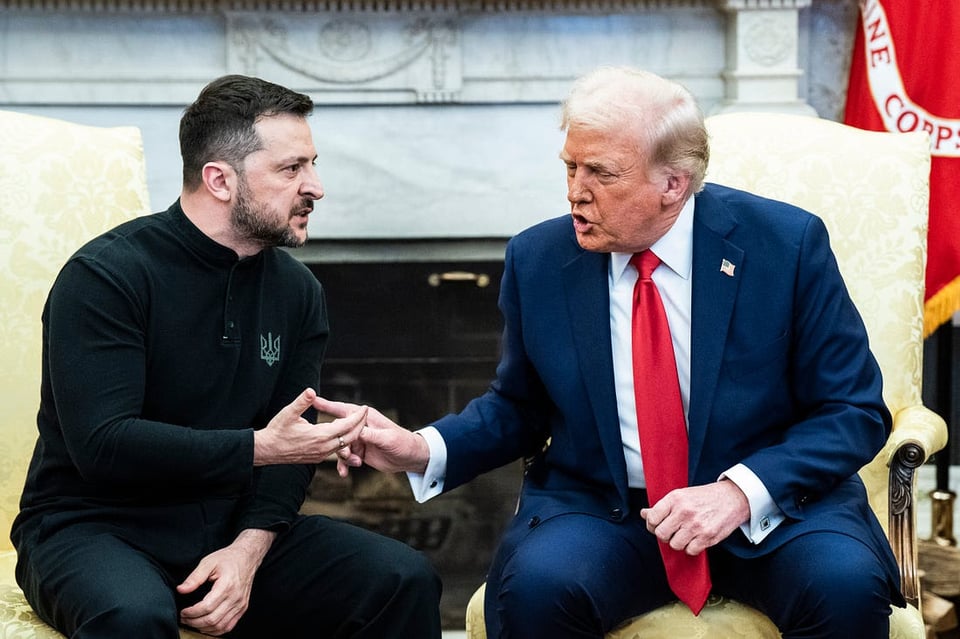
It’s been a long time since the Russian dictator had it this good.
It was a hell of a weekend for bad men getting what they paid for out of Donald Trump. And while we’ll focus on Vladimir Putin here, we don’t want to fully ignore venture capitalist David Sacks, Donald Trump’s “crypto czar,” who seemingly stands to make bank following Trump’s weekend announcement of a “strategic cryptocurrency reserve.” Hey, we’re glad someone’s having fun. Happy Monday.
The Oval Fiasco by William Kristol
Friday’s disgraceful spectacle in the Oval Office was shocking.
It was shocking because we can still remember when U.S. presidents didn’t routinely disgrace their trust. It was shocking because we are not yet used to seeing the Oval Office as a setting in which an American president bullies a democratic leader on behalf of a brutal dictator.
But the sickening spectacle shouldn’t have been surprising. In the last few weeks, with the phone call with Vladimir Putin, the Pete Hegseth and JD Vance speeches in Europe, and the Marco Rubio meeting in Riyadh, it had become altogether clear that in his second term, Trump’s pro-Putin stance would be unencumbered and unapologetic.
And so the Financial Times warned back on February 21 that “those who thought America was a friend or ally” would have to instead deal with a world in which “America is an unabashed predator.”
The FT asked what the events of the preceding week told us about the future:
First, there should be no doubt that Trump’s contempt for allies and admiration for strongmen is real and will endure. . . .
Second, Trump is only getting started. . . .
After three generations of US leadership, it is always tempting to believe that Trump does not mean what he says. . . . But allies and erstwhile friends must banish these self-soothing thoughts. . . . America has turned.
That was ten days ago.
Friday’s Oval Office mugging of Volodymyr Zelensky was simply the next step in the turn. Trump wanted to undercut Zelensky’s support here at home, at least with Republicans who’d heretofore been pro-Ukraine. And so he and Vance set out to create a mini-drama that would allow Trump to say afterwards that Zelensky wasn’t a “partner for peace.” Previously pro-Ukraine Republicans like Lindsey Graham dutifully joined the pile-on.
In Europe, they understood what was happening. The German press on Saturday morning declared: “It is now the law of the jungle.” “The former leading power of the West can no longer be relied upon.”
And the German foreign minister, Annalena Baerbock, said later that day, “We can never accept a reversal of perpetrator and victim. Such a reversal would mean the end of . . . the security of most states. And in the long run, it would also be fatal for the future of the United States.”
So our allies are properly alarmed and outraged. The Putin regime, on the other hand, is gleeful and triumphant. They understand how important it is that the Trump administration has joined them in pursuing a world in which perpetrators are rewarded and victims abandoned.
As the Washington Post reports this morning, Kremlin spokesman Dmitry Peskov proclaimed that “The new [U.S.] administration is rapidly changing all foreign policy configurations. This largely aligns with our vision.” Peskov continued: “If the political will of the two leaders, President Putin and President Trump, is maintained, this path can be quite quick and successful.”
What can be done by those who believe this path to be both dishonorable and disastrous; by those who believe that the world Putin is trying to create and that Trump welcomes is not a world the United States should want?
Unlike Russia, this is still a representative democracy. There’s another elective branch of the government, Congress. It has 535 elected representatives. They are independent of the executive. They debate. They vote.
It’s true that in foreign policy, presidents have a lot of leeway. But Congress has fought presidents on foreign policy matters in the past, as Lyndon Johnson, Jimmy Carter, George W. Bush, and others can attest. Congress has the power of the purse. It can appropriate and withhold funds. More broadly, Congress can, on behalf of the American people, remind friends and enemies alike that here the president is not all-powerful, and that his policies can be modified while in office and reversed afterwards.
But Republicans control Congress, you say. It’s hopeless.
Maybe. But there are Republicans who understand what’s at stake. A few spoke out this weekend, such as Don Bacon in the House and Lisa Murkowski in the Senate. The fact is that going forward a small group of Republicans in the Senate and the House, acting in concert among themselves and in cooperation with the Democrats, could make a fundamental difference. With their support, Congress could pass resolutions supporting Ukraine and NATO and condemning Putin. They could insist that aid for Ukraine be added to continuing resolutions and appropriations bills.
They could do this if they remembered Edmund Burke’s admonition that a representative owes his constituents “his unbiased opinion, his mature judgment, his enlightened conscience.” These are “a trust from Providence, for the abuse of which he is deeply answerable.”
Honoring their trust from Providence or behaving as a rubber stamp for Donald Trump—which legacy is it to be?
We know not what course others might take, but as for us—we’re always going to choose Burke’s course over allegiance to party or tribe. Join us.
Heather Cox Richardson. Letters from an American, March 2, 2025.
On February 28, the same day that President Donald Trump and Vice President J.D. Vance took the side of Russian president Vladimir Putin against Ukraine president Volodymyr Zelensky in the Oval Office, Martin Matishak of The Record, a cybersecurity news publication, broke the story that Defense Secretary Pete Hegseth has ordered U.S. Cyber Command to stop all planning against Russia, including offensive digital actions.
Both the scope of the directive and its duration are unclear.
On Face the Nation this morning, Representative Mike Turner (R-OH), a strong supporter of the North Atlantic Treaty Organization (NATO) and Ukraine, contradicted that information. “Considering what I know, what Russia is currently doing against the United States, that would I’m certain not be an accurate statement of the current status of the United States operations,” he said. Well respected on both sides of the aisle, Turner was in line to be the chair of the House Intelligence Committee in this Congress until House speaker Mike Johnson (R-LA) removed him from that slot and from the intelligence committee altogether.
And yet, as Stephanie Kirchgaessner of The Guardian notes, the Trump administration has made clear that it no longer sees Russia as a cybersecurity threat. Last week, at a United Nations working group on cybersecurity, representatives from the European Union and the United Kingdom highlighted threats from Russia, while Liesyl Franz, the State Department’s deputy assistant secretary for international cybersecurity, did not mention Russia, saying the U.S. was concerned about threats from China and Iran.
Kirchgaessner also noted that under Trump, the Cybersecurity and Infrastructure Security Agency (CISA), which monitors cyberthreats against critical infrastructure, has set new priorities. Although Russian threats, especially those against U.S. election systems, were a top priority for the agency in the past, a source told Kirchgaessner that analysts were told not to follow or report on Russian threats.
“Russia and China are our biggest adversaries,” the source told Kirchgaessner. “With all the cuts being made to different agencies, a lot of cybersecurity personnel have been fired. Our systems are not going to be protected and our adversaries know this.” “People are saying Russia is winning,” the source said. “Putin is on the inside now.”
Another source noted that “There are dozens of discrete Russia state-sponsored hacker teams dedicated to either producing damage to US government, infrastructure and commercial interests or conducting information theft with a key goal of maintaining persistent access to computer systems.” “Russia is at least on par with China as the most significant cyber threat, the person added. Under those circumstances, the source said, ceasing to follow and report Russian threats is “truly shocking.”
Trump’s outburst in the Oval Office on Friday confirmed that Putin has been his partner in politics since at least 2016. “Putin went through a hell of a lot with me,” Trump said. “He went through a phony witch hunt where they used him and Russia… Russia, Russia, Russia—you ever hear of that deal?—that was a phony Hunter Biden, Joe Biden, scam. Hillary Clinton, shifty Adam Schiff, it was a Democrat scam. And he had to go through that. And he did go through it, and we didn’t end up in a war. And he went through it. He was accused of all that stuff. He had nothing to do with it. It came out of Hunter Biden’s bathroom.”
Putin went through a hell of a lot with Trump? It was an odd statement from a U.S. president, whose loyalty is supposed to be dedicated to the Constitution and the American people.
Trump has made dismissing as a hoax what he calls “Russia, Russia, Russia” central to his political narrative. But Russian operatives did, in fact, work to elect him in 2016. A 2020 report from the Republican-dominated Senate Intelligence Committee confirmed that Putin ordered hacks of Democratic computer networks, and at two crucial moments WikiLeaks, which the Senate committee concluded was allied with the Russians, dumped illegally obtained emails that were intended to hurt the candidacy of Democratic candidate Hillary Clinton. Trump openly called for Russia to hack Clinton’s emails.
Russian operatives also flooded social media with disinformation, not necessarily explicitly endorsing Trump, but spreading lies about Clinton to depress Democratic turnout, or to rile up those on the right by falsely claiming that Democrats intended to ban the Pledge of Allegiance, for example. The goal of the propaganda was not simply to elect Trump. It was to pit the far ends of the political spectrum against the middle, tearing the nation apart.
Fake accounts on Twitter, YouTube, Instagram, and Facebook drove wedges between Americans over issues of race, immigration, and gun rights. Craig Timberg and Tony Romm of the Washington Post reported in 2018 that Facebook officials told Congress that the Russian campaign reached 126 million people on Facebook and 20 million on Instagram.
That effort was not a one-shot deal: Russians worked to influence the 2020 presidential election, too. In 2021 the Office of the Director of National Intelligence concluded that Putin “authorized, and a range of Russian government organizations conducted, influence operations aimed at denigrating President [Joe] Biden’s candidacy and the Democratic Party, supporting former President Trump, undermining public confidence in the electoral process, and exacerbating sociopolitical division in the US.” But “[u]nlike in 2016,” the report said, “we did not see persistent Russian cyber efforts to gain access to election infrastructure.”
Moscow used “proxies linked to Russian intelligence to push influence narratives—including misleading or unsubstantiated allegations against President Biden—to US media organizations, US officials, and prominent US individuals, including some close to former President Trump and his administration,” the Office of the Director of National Intelligence concluded.
In October 2024, Matthew Olsen, head of the Justice Department’s National Security Division, warned in an interview with CBS News that Russia was bombarding voters with propaganda to divide Americans before that year’s election, as well. Operatives were not just posting fake stories and replying to posts, but were also using AI to manufacture fake videos and laundering Russian talking points through social media influencers. Just a month before, news had broken that Russia was funding Tenet Media, a company that hired right-wing personalities Tim Pool, Dave Rubin, Benny Johnson, Lauren Southern, Tayler Hansen, and Matt Christiansen, who repeated Russian talking points.
Now back in office, Trump and MAGA loyalists say that efforts to stop disinformation undermine their right to free speech. Project 2025, the extremist blueprint for the second Trump administration, denied that Russia had interfered in the 2016 election—calling it “a Clinton campaign dirty trick”—and called for ending government efforts to stop disinformation with “utmost urgency.” “The federal government cannot be the arbiter of truth,” it said.
On February 20, Steven Lee Myers, Julian E. Barnes, and Sheera Frenkel of the New York Times reported that the Trump administration is firing or reassigning officials at the FBI and CISA who had worked on protecting elections. That includes those trying to stop foreign propaganda and disinformation and those combating cyberattacks and attempts to disrupt voting systems.
Independent journalist Marisa Kabas broke the story that two members of the “Department of Government Efficiency” are now installed at CISA: Edward Coristine, a 19-year-old known as “Big Balls,” and Kyle Schutt, a 38-year-old software engineer. Kim Zetter of Wired reported that since 2018, CISA has “helped state and local election offices around the country assess vulnerabilities in their networks and help secure them.”
During the 2024 campaign, Trump said repeatedly that he would end the war in Ukraine. Shortly after the election, a newspaper reporter asked Nikolai Patrushev, who is close to Putin, if Trump’s election would mean “positive changes from Russia’s point of view.” Patrushev answered: “To achieve success in the elections, Donald Trump relied on certain forces to which he has corresponding obligations. And as a responsible person, he will be obliged to fulfill them.”
Today, Kremlin spokesperson Dmitry Peskov told a reporter: “The new administration is rapidly changing all foreign policy configurations. This largely aligns with our vision.” (Letters from an American, Substack).
A comprehensive look at why Trump, always whacked out, is especially whacked out about Canada.
What’s Behind Trump’s Love-Hate Relationship With Canada
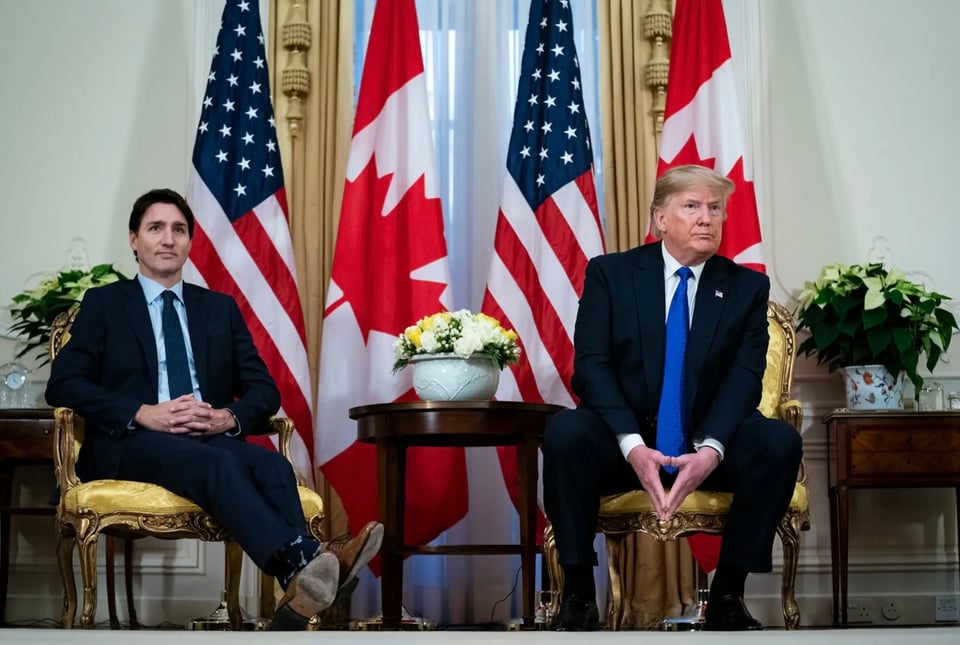
There is the theory that President Trump is still bitter about his Canadian hotel ventures that went bust.
Some, on social media, have speculated that a 2019 photograph in which Justin Trudeau appeared poised to kiss Melania Trump, the first lady, at a Group of 7 gathering in France, left Mr. Trump with a grudge against the dashing Canadian prime minister.
And then there is the transactional view, that Mr. Trump sees the acquisition of Canada as the 51st state as the ultimate real estate deal that would seal his presidential legacy.
As Mr. Trump prepares to push ahead with a new round of tariffs on the United States’ neighbors to the north and south, he has expressed a special brand of loathing for Canada. The bullying of a country whose most prominent stereotype is that its people are “nice” has led to political upheaval in Canada and created both consternation and speculation about why Mr. Trump wants to engage in a trade war with one of America’s biggest trading partners.
“I can’t quite figure it out,” said Stephen Moore, the Heritage Foundation economist and former adviser to Mr. Trump. “Whether it’s some kind of strategic leverage, I don’t know.”
Noting that there is “no love lost” between the president and Mr. Trudeau, Mr. Moore added: “With Trump, politics is personal.”
Mr. Trump has threatened to hit Mexico and Canada with 25 percent tariffs on all imports on Tuesday unless the countries do more to prevent migrants and drugs from flowing into the United States. On Saturday, the president picked another trade fight with Canada, this time over lumber.
Intrigue abounds in Canada about why Mr. Trump has repeatedly belittled a neighbor and threatened to destabilize its economy with tariffs, a process that has brought relations between the two countries to a low point not seen in decades.
In contrast to the close and supportive relationship that Mr. Trudeau, who is entering his final week in office, enjoyed with another U.S. president, Barack Obama, his relationship with Mr. Trump has been fractious.
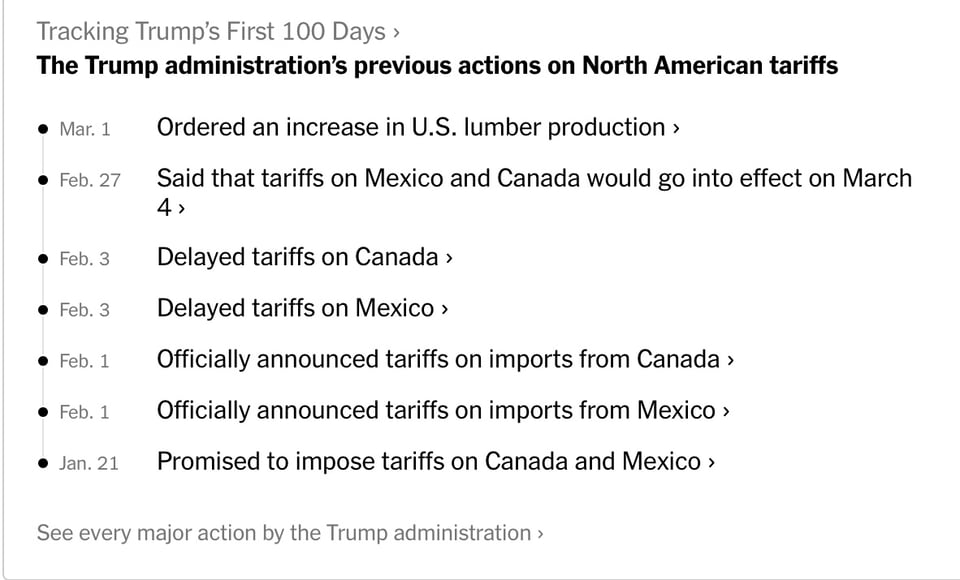
In 2018, following the Group of 7 summit meeting in Charlevoix, Quebec, Mr. Trump heckled Mr. Trudeau on social media, accusing him of being “very dishonest and weak” and of making up “false statements” while suggesting that he might impose tariffs on Canadian-made autos.
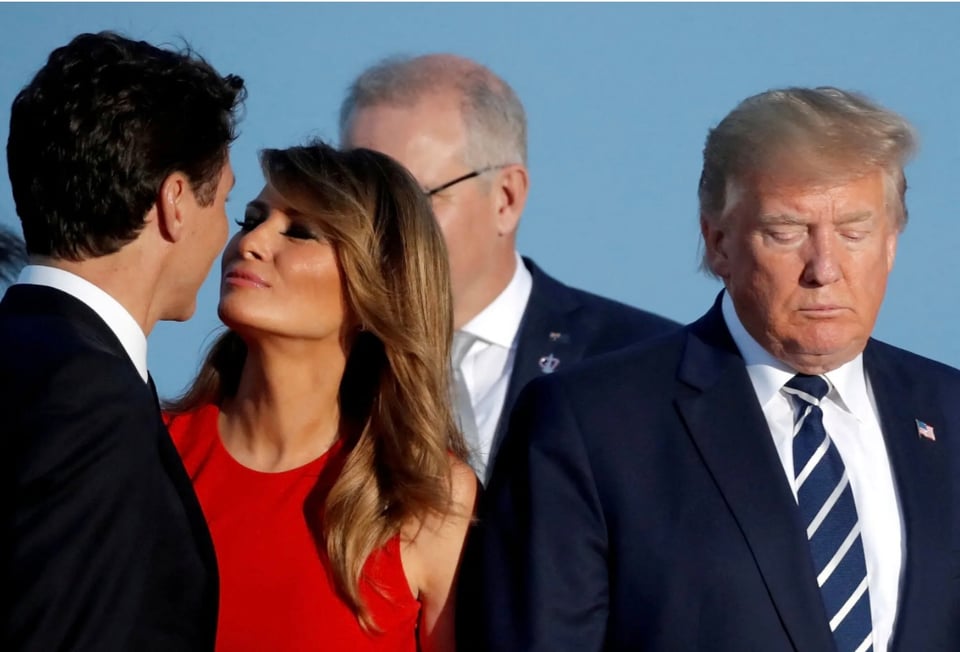
First lady Melania Trump kisses Canada’s Prime Minister Justin Trudeau next to U.S. President Donald Trump during the family photo with invited guests at the G7 summit in Biarritz, France, August 2019.
In candid remarks to a group of business leaders last month that was captured by a microphone, Mr. Trudeau offered a theory for Mr. Trump’s Canada obsession that is widely shared in the country.
“Not only does the Trump administration know how many critical minerals we have, but that may be even why they keep talking about absorbing us and making us the 51st state,” Mr. Trudeau told the gathering in Toronto.
“They’re very aware of our resources,” Mr. Trudeau said, “of what we have, and they very much want to be able to benefit from those.”
He added: “But Mr. Trump has it in mind that one of the easiest ways of doing that is absorbing our country. And it is a real thing.”
Mr. Trump does have a particular affinity for minerals. He has been pushing to broker a deal to secure access to Ukraine’s supply of rare earths as he seeks to broker an agreement to end its war with Russia.
As a businessman, Mr. Trump had two dealings with Canada that, while relatively limited, were both failures. The Toronto hotel and condominium project, owned by a Toronto investor who licensed the Trump name and hired a Trump company to manage it, went into receivership in 2016. The following year, a hotel owned by Malaysian investors bearing the Trump name, again under license and with a similar management contract, opened in Vancouver, British Columbia. (Promotional material exaggerated the building’s height.) It failed, as well.
Both hotels, which now operate under different names and management, were magnets for protesters in a country where Mr. Trump has long been unpopular for his “America First” views and disparagement of Canada. Before the Vancouver opening, the city’s mayor at the time, Gregor Robertson, wrote to the building’s owners asking that they not use the Trump name on it.
“Trump’s name and brand have no more place on Vancouver’s skyline than his ignorant ideas have in the modern world,” Mr. Robertson wrote.
Before delving into politics, Mr. Trump expressed little ill will toward Canada.
In 2012, when the Obama administration was delaying a decision on approving the Keystone XL Pipeline, which would have transported oil from Canada to the United States, Mr. Trump declared on social media that the project must move forward.
“We need to use our resources and support allies like Canada,” Mr. Trump said.
But by 2015, his perceived failings of the North American Free Trade Agreement between the United States, Canada and Mexico became a central issue of Mr. Trump’s first presidential campaign. Mr. Trump routinely called the deal a “disaster” for American workers, and prioritized scrapping the pact as a first order of business if he won the election.
An agreement to overhaul the trade deal was signed in 2020 after fraught negotiations between the three countries that often grew contentious. At one point, Mr. Trump suggested leaving Canada on the sidelines and proceeding with a deal between the United States and Mexico.
Now back in office, Mr. Trump has made clear that the agreement he signed did not do enough for the United States and must be rewritten. In recent days he has lashed out at Chrystia Freeland, the Canadian official who negotiated it on behalf of Canada.
“She’s a whack,” Mr. Trump said of Ms. Freeland, who was Canada’s deputy prime minister and finance minister during the president’s first term, in an interview with The Spectator.
As Mr. Trump has wielded the threat of new tariffs on Canada over the last month, his tone toward the departing prime minister has been even more derisive. He has nicknamed Mr. Trudeau “governor” amid persistent suggestions that the United States might annex Canada.
Mr. Trump even called for the former Canadian hockey player Wayne Gretzky to run for prime minister, suggesting late last year that he would “win easily.” Mr. Gretzky, who does not support Canada’s joining the United States, has faced backlash at home from citizens who view him as a traitor because of his association with Mr. Trump.
The insults have led to a boom in nationalism in Canada, including “Made in Canada” Facebook groups. In one group, which has more than a million members, Canadians compared notes on pancake mixes that are made in Canada and offered recommendations on flavors of Cove Soda, a potential alternative to Coca-Cola.
“There’s a generalized sense of patriotism that has not been evident in Canada in many years in response to Trump and Trump’s hostility,” said Ira Wells, a professor at the University of Toronto’s Victoria College.
But Mr. Trump appears unfazed by Canada’s declarations of independence. He indicated last week that the United States was also prepared to sever ties with Canada without changes to the trade relationship between the two countries.
The United States, Mr. Trump said, has no need for Canadian products such as lumber, and he asserted that Canada could not survive without American military protection and favorable trade terms.
“I love Canada, I love the people of Canada,” Mr. Trump said at a cabinet meeting at the White House. “It’s not fair for us to be supporting Canada — If we don’t support them, they don’t subsist as a nation.” (New York Times).
Good ideas.
Below are a series of good ideas. Now each of us must do our part!
Here's the One Thing You Can Do Right Now to Oppose Fascism
I usually respond by saying, “Here’s what to do: something.”
It sounds sarcastic, flippant, perhaps a bit condescending, but I mean it.
Lately, I think the velocity and scope of the horrible news has made many of us forget what we know, distracting us and leaving us paralyzed with fear and inaction (which by the way, is precisely the goal of those skilled sociopaths generating the horrible news).
But here’s the thing about activism and social justice work: generally speaking, they don’t change depending on the political climate, the balance of power in Congress, the occupant of the White House, or the category of the current shit storm (which is off the charts).
Positive cultural change today (as it has always been) is about leveraging your life where you are: by doing small, possible, measurable daily acts of decency, of protest, of advocacy, of collaboration.
The reason I or anyone else can’t tell you exactly what to do, (outside of Congressional phone numbers to call or national events to plug into) is that no one else has the vantage point of the world that you have.
No one is situated in the precise community where you live, with the exact circle of influence you have, with the local connections you’ve made, with the specific knowledge of the way the massive national Trump sewage pipeline flows into your little community—but you do.
I always share with people I meet in my travels, that we always, always have two things in our possession no matter the geography or the conditions: proximity to need and agency to alleviate it. As you read or hear these words, you have them.
For example, within a mile of you (or perhaps within a few keystrokes) you likely know of all sorts of nonprofits, political groups, faith communities, community centers, interfaith organizations, who long before November 5th, have been in the business of supporting vulnerable communities, of feeding hungry neighbors, of engaging the political system locally, of being allies for the marginalized. Don’t you?
Well, there’s a good chance those entities are now, without exception—more overworked, underfunded, under duress, and struggling more than ever to meet the need this presidency has created.
So, the something you need to do right now, might very well be about simply calling or emailing or stopping by and asking “How can I help?” I can promise you, they will give you a tangible, doable task that will allow you to participate in their efforts. You’ll be moving from the cloudiness of theory and the stress of wondering, and into the clarity of doing and you’ll also be doing alongside other like-hearted human beings. You’ll receive new information, get better questions, and probably be led right into the next something that needs doing.
There’s also a high likelihood that in your circle of friends, your neighborhood, your online network, you know compassionate, courageous, talented, pissed-off people who are out in the community as we speak: organizing protests, attending school board meetings, writing postcards, calling lawmakers, making meals, driving people to medical appointments.
Or, if they aren’t already, they’d probably jump at the chance to collaborate on some good trouble with a willing coconspirator. There’s no better time to reach out with a text or an email saying, “I know we’re both feeling the same about all of this. Do you want to get together for coffee and scheme about partnering against this fascist bullshit?” I bet you’ll get more yes’s than no’s.
Friends, I know it’s grim and terrifying and batshit crazy out there in ways we’ve never experienced, but that actually good news as far as the something you can do. (John Pavlowitz, Substack).
We can all call our elected officials, our Congresspeople, our Senators, our Governors, Mayors, School And Community Board members.
In the spirit of reaching out to elected officials, one man did this:
🚨EXTRAORDINARY FULL PAGE AD in today’s @nytimes by Cuban American businessman Mike Fernandez savaging the Trump Administration and calling for 5 @GOP senators @SenMcConnell @lisamurkowski @SenatorCollins @SenThomTillis @SenJohnCurtis to band together to stop him!
— Fernand R. Amandi (@AmandiOnAir) March 2, 2025
Incredible! 👏🏼 pic.twitter.com/KCXyymJdVS
BREAKING: JB Pritzker is launching a movement to flood Congress with calls speaking out against Donald Trump and Elon Musk. This is amazing. pic.twitter.com/GWLx0MDAZI
— Democratic Wins Media (@DemocraticWins) March 3, 2025
Call your Governor. 👇
From Jay Kuo. Governors of blue states need to start holding frequent pressers on how Trump and Musk policies and actions are impacting the state and what they are doing in response. Call your governor and insist they speak out.
From Simon Rosenberg. Hoppium chronicles.
Fight The Musk Attack On Our Government And Our Privacy, End His Historic Crime Spree - .
Encourage your Senators and Reps to let Facts be be submitted to a candid world and criminal referrals filed for him and his malicious posse to DOJ/FBI; insist our Senators and Reps file amicus briefs in the court cases regarding the usurpation of their Constitutional authorities or file suits of their own; encourage them to hold a daily morning press conference to more aggressively challenge Musk’s ransacking of the USG that is making America less prosperous, less healthy, less safe and far less respected in the world.
Organize Against The 17 Most Vulnerable Republican House Members - For those of you who live in AZ, CA, CO, IA, MI, NE, NJ, NY, PA, VA, WI please start talking to your local orgs - state and local Democratic parties, grassroots groups, traditional Dem allies - about mounting a campaign targeting the most vulnerable 17 Republican House Members to urge them to vote against whatever joint House-Senate reconciliation bill emerges in the coming weeks. We launched this new effort two weeks ago and while we should be urging all our Senators and Reps to vote against these emerging plans, those of you can work these 17 House Rs have a special role to play in this next phase of the battle over the budget.
Keep Calling Attorneys General In The States -
Ask them to protect you and your data, tax returns and privacy, and to keep federally mandated monies flowing to your states and communities. For those in the 19 states that brought the successful Treasury suit thank them and encourage them to keep going. I still believe these 19 states should make criminal referrals of Musk/his posse to DOJ/FBI and raise the stakes.
Protest, Loudly, Trump’s Embrace of Russia and Abandonment of Europe - Let your electeds know you are outraged by traitorous Trump’s selling out of Zelenskyy, abandonment of Europe and embrace of Putin; and that we cannot accept this level of appeasement of someone who is a clear enemy of America and the West, and certainly not an ally. Demand that Trump not let his Saudi meeting w/Putin become our Munich; demand that he not become our Neville Chamberlain.
Despair less. Do more.
As to the State of the Union…
Some don’t want to hear Trump lies.
BREAKING: In a brilliant maneuver, Sen. Ron Wyden announces that he will join Sen. Chris Murphy in skipping Trump's speech before Congress, choosing to hold a town hall instead, saying his constituents are "not interested in the Trump alternate reality." pic.twitter.com/18v1KyasVI
— Really American 🇺🇸 (@ReallyAmerican1) March 3, 2025
Some will go, with special guests.
To broadcast . . .opposition, many lawmakers have invited former federal employees who were laid off in recent weeks to be in the House chamber for Trump’s first major speech since his return to power. The idea is to showcase the human effects of Trump’s firing spree all across the country.
With that in mind, the list of attendees extends far beyond the Washington-metro region.
In north Illinois, Rep. Brad Schneider (D-Ill.) has invited Adam Mulvey, an Army veteran of the Iraq and Afghanistan wars, who was fired last month from a federal health center in Chicago.
In the Bronx, Rep. Ritchie Torres (D-N.Y.) will attend with Nancy Bolan, another federal health worker who was fired in January from the U.S. Agency for International Development.
In Queens, Rep. Grace Meng (D-N.Y.) has invited Luke Graziani, an Army veteran who served two tours each in Iraq and Afghanistan. He was let go last month after working for almost a year at a veterans health facility in the Bronx.
From coastal California, Rep. Jimmy Panetta (D-Calif.) is bringing Ben Vizzachero, a U.S. Forest Service employee who was recently terminated from his job at the Los Padres National Forest.
The list goes on. (The Hill).
One more thing.
Want to make Trump cry?
Don’t watch The State of the Union live tonight.
Set your television (9 pm ET) to any other channel which is NOT showing the live speech. You can always stream it later on the web.
Give Trump the lowest SOTU ratings ever!
We won’t miss much. There will be no Nancy Pelosi moment to make us smile.
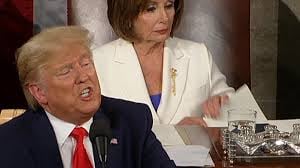
The memory of this made me cry.
After 9/11, NATO's Article 5 was invoked for the first (and only) time ever by the United States.
— Pekka Kallioniemi (@P_Kallioniemi) March 2, 2025
Troops from the UK, Canada, Germany, France, Italy, the Netherlands, Denmark, Australia, Spain, Poland, Norway, Romania, Turkey, New Zealand, Estonia, Lithuania, Latvia, Ukraine,… pic.twitter.com/vXqXdIn6lM